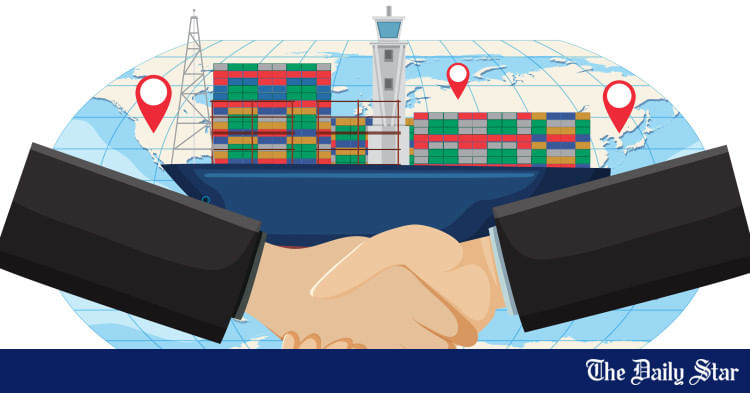Our Terms & Conditions | Our Privacy Policy
How Bangladesh can build its trade negotiation capabilities
International trade has long transcended the mere exchange of goods and services. It has evolved into a powerful instrument for fostering economic cooperation among nations. Today’s global trading system, anchored in agreed rules and regulations, provides a framework for countries to engage in meaningful negotiations at bilateral, regional, and multilateral levels. Trade, and by extension trade negotiations, are not purely commercial endeavours; they are deeply intertwined with domestic socioeconomic and political priorities that must be reconciled with mutually beneficial outcomes with trading partners.
Historically, Bangladesh has benefited from preferential, duty-free access to several markets, which limited the need for extensive trade negotiations. However, as the country prepares to graduate from the group of least developed countries (LDCs) in 2026, there is growing urgency to secure preferential trade agreements, diversify the export basket, and enhance trade competitiveness. Although preferential treatment will continue for three years after graduation, Bangladesh must proactively pursue trade agreements that ensure favourable market access while also strengthening its export competitiveness.
For all latest news, follow The Daily Star’s Google News channel.
The next generation of trade policies must aim to expand Bangladesh’s footprint in global value chains and gradually phase out domestic protective measures. Crafting such policies is a demanding exercise—requiring rigorous economic, financial, and social analysis, clarity of purpose, and a careful balance between technocratic precision and factors of political economy. Trade policy must reflect the realities of a nearly half-trillion-dollar economy, vastly different from the early 1990s when ready-made garment exports started to rise.
Currently, the domestic trade and tariff discourse in Bangladesh remains narrowly focused on immediate concerns, such as tariff reductions and public revenue impacts. While these issues are valid, the policy calculus must also account for potential spillovers—such as financial inflows, technology transfer, and increased competition—that can benefit domestic industries. Moreover, comparative and competitive advantage analysis should be forward-looking with a view to structural changes in the economy. All these considerations can shape the contours of future trade negotiations.
Bangladesh must also contend with a resurgence of industrial policies being adopted by emerging and high-income countries to boost competitiveness and advance strategic interests. Although not conclusive, there is evidence that well-designed protection measures, such as industrial policies in developing countries, can be effective, provided these are targeted and time-bound. A lesson from this growing body of evidence is that industrial policies have a role to play. But these measures should be limited to building domestic productive capabilities, clinically targeted, closely tied to performance, and with a clear exit strategy.
Looking ahead, there is a need to develop human capital and institutional frameworks that nurture trade negotiation expertise and serve as repositories of knowledge accessible to policymakers for decision-making. Building trade negotiation capabilities requires sustained investment in training and mentoring, equipping future negotiators with a solid grounding in trade theory and practice. Trade negotiations demand a mastery of complex rules and a deep understanding of products and services. This is especially relevant given the rise of intermediate goods in global supply chains and the growing importance of services, including digital services that cross borders in virtual space.
Exporters must also meet decarbonisation targets and comply with environmental, social, and governance (ESG) standards. These, for example, include the EU’s Carbon Border Adjustment Mechanism (CBAM) and Generalized Scheme of Preferences (GSP+). International buyers are increasingly demanding products that meet environmental and labour standards and are aligned with circular economy guidelines. Technical proficiency in trade analytics alone is not enough. Negotiators must also possess interpersonal skills, including cultural sensitivity, as trade talks often involve engagement with counterparts from diverse backgrounds. Understanding cultural norms and values can be pivotal in building rapport and trust.
Given the complexity of trade agreements, negotiators also require robust support systems to crystallise issues and priorities that can underpin strategy and tactics. The support should come from multidisciplinary teams capable of conducting economic and social cost-benefit scanning. There are analytical tools available that can be customised and used to reduce the burden of extensive research and modelling. As Bangladesh explores new export destinations and deepens its economic diplomacy, trade negotiation capabilities must be treated as a long-term national endeavour that demands investment not only in human skills but also in institutional mechanisms to internalise learning.
A two-layered system comprising a national pool of trade experts and negotiators with representatives from government, non-state actors, such as think tanks, the private sector, and civil society, can serve as a knowledge bank. The national pool should have a strong interface with the Ministry of Commerce, which typically leads trade negotiations on behalf of the government. The trade negotiators’ pool should receive strategic backstopping through an organisational mechanism, ensuring continuity, coordination, and institutional memory. With the formal launch of the Trade Negotiators Pool, supported by the United Nations Development Programme (UNDP) and the UK government, Bangladesh is already taking steps to institutionalise national capabilities. This momentum must be sustained.
Owais Parray is country economic adviser of UNDP Bangladesh
Views expressed in this article are the author’s own.
Follow The Daily Star Opinion on Facebook for the latest opinions, commentaries and analyses by experts and professionals. To contribute your article or letter to The Daily Star Opinion, see our guidelines for submission.
Images are for reference only.Images and contents gathered automatic from google or 3rd party sources.All rights on the images and contents are with their legal original owners.



Comments are closed.